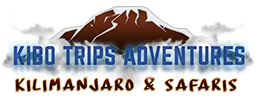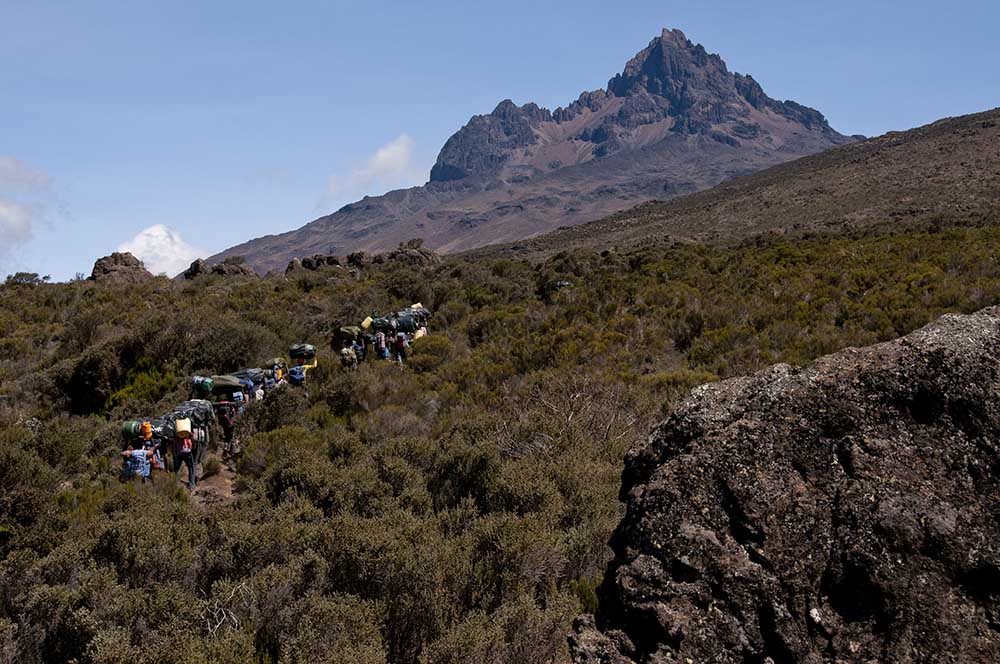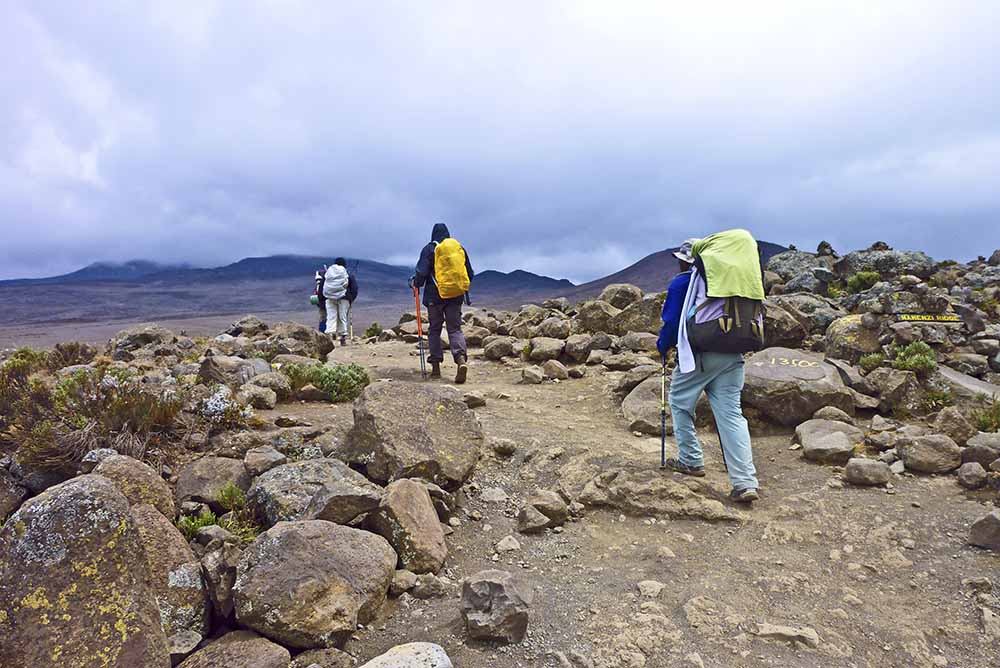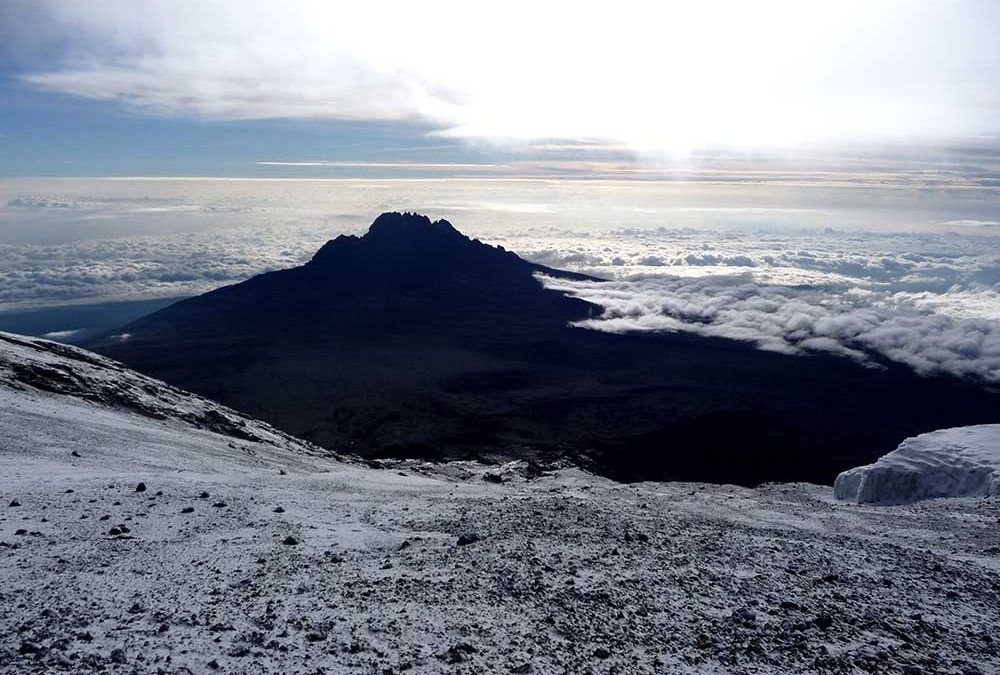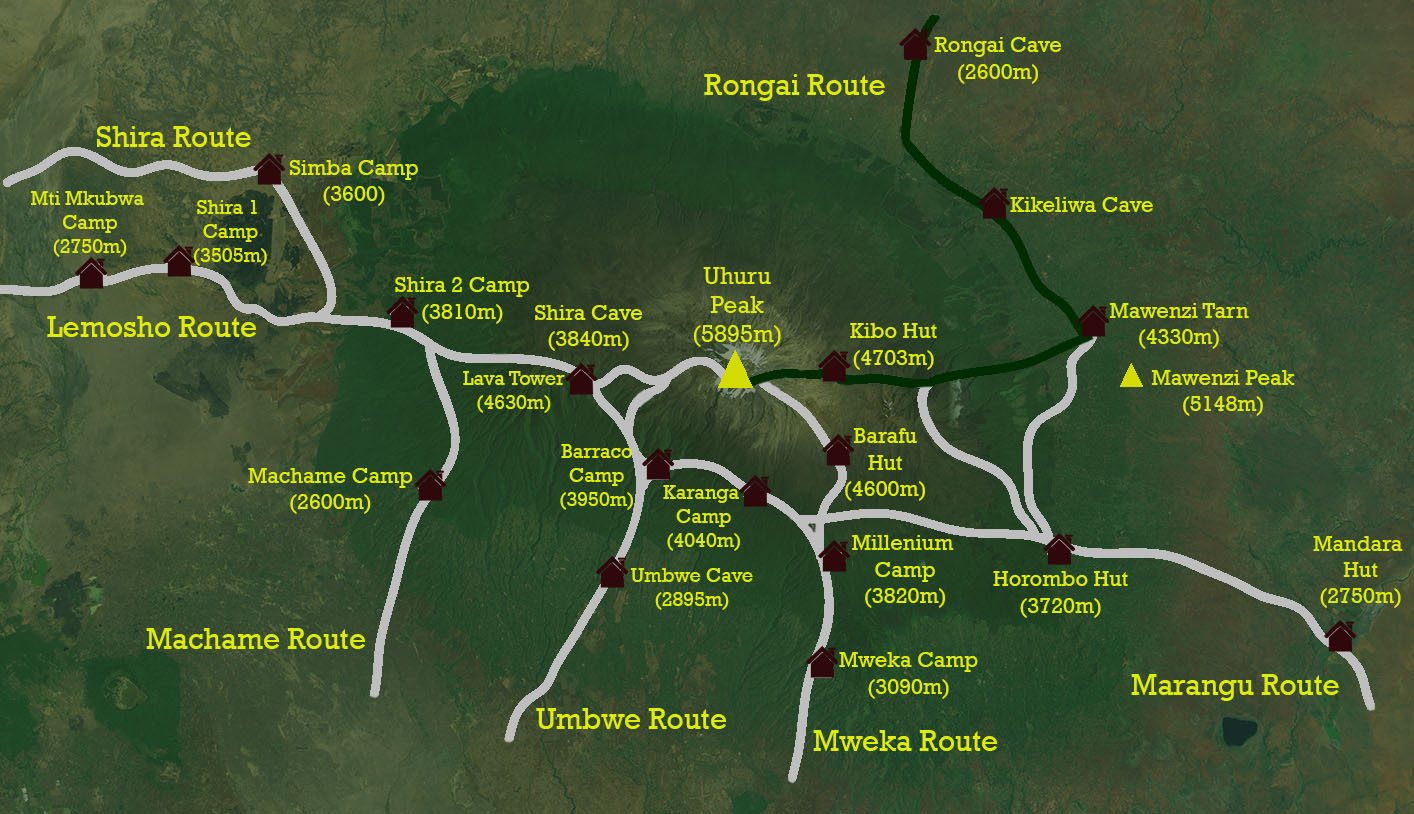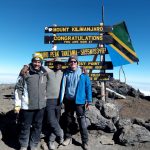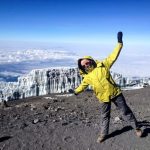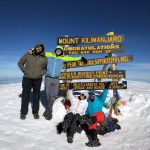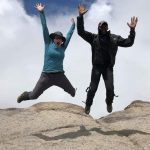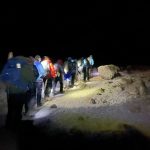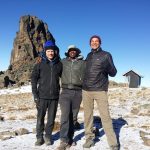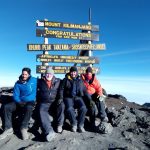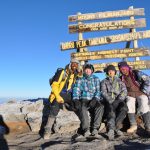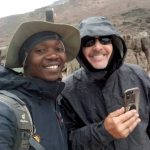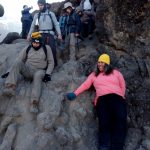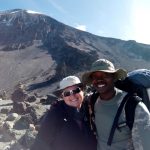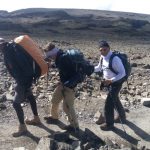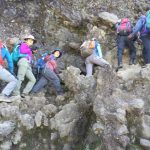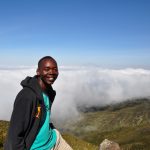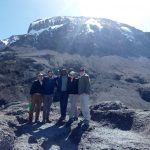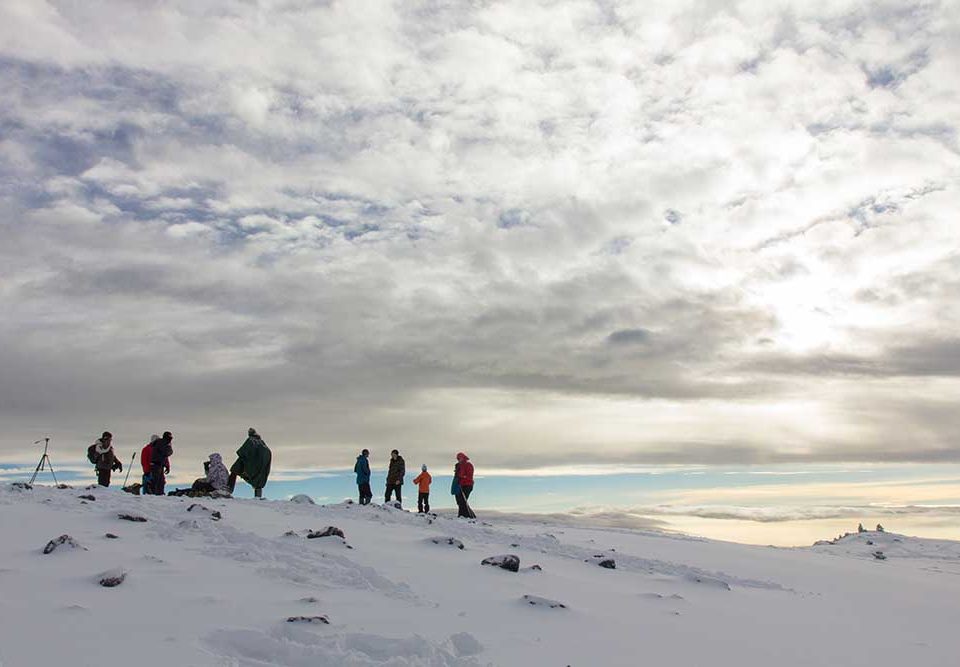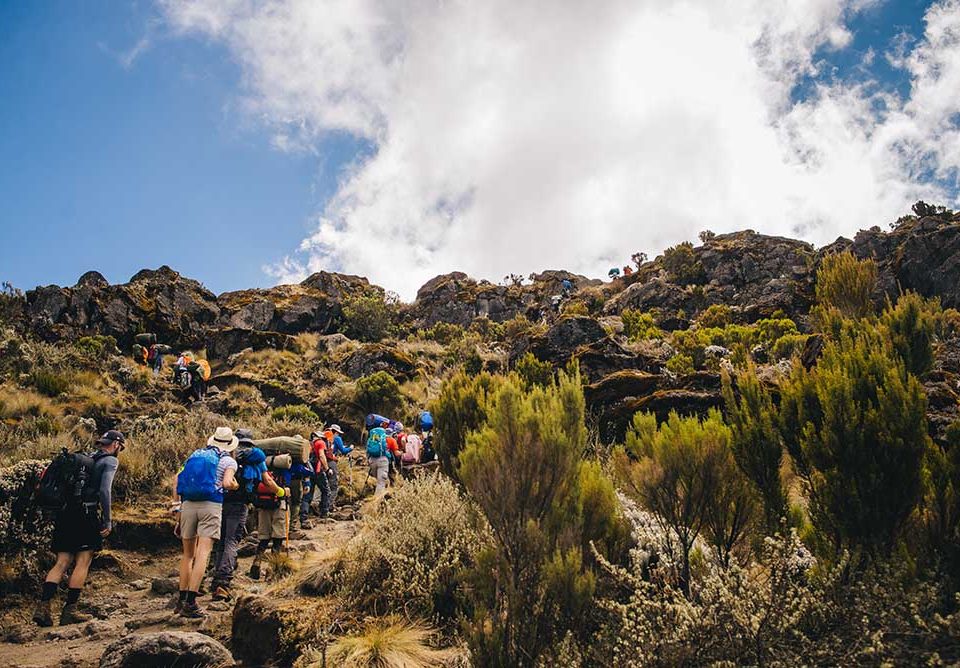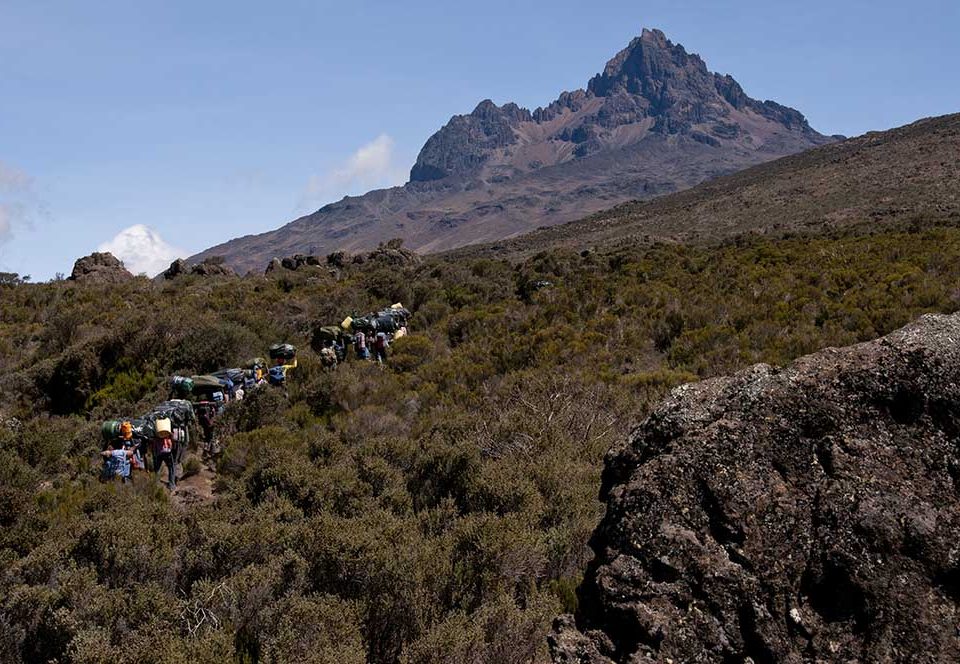Rongai Route 7 Days
SUCCESS RATE 94% - 98%
Day 1: Nale Muru Gate (6,400 ft/1,950 m) to Simba Camp (9,020 ft/2,750 m) 8km, 3-4 hours
Following breakfast you will have a briefing from your guide. At 8 am, our staff will drive you from your hotel in Moshi or Arusha to the wooded village of Nale Muru. The drive past villages and many coffee plantations will take 4-5 hours. When you arrive, your guides and porters will prepare your equipment and supplies while you complete registration with the Kilimanjaro Park Office. You will begin your trek through fields of maize and potatoes before you enter the pine forest. Your ascent begins in the forest occupied by various wildlife. The trees of the forest become sparser as you reach the Simba Camp which is near the First Cave. Your camp sits at the edge of the moorland zone with spectacular views of the plains of Kenya. When you arrive, you will find your camp and tent is already set up by the porters who ran ahead. They will bring you boiled drinking water and washing water in preparation for dinner.
Day 2: Simba Camp (9,020 ft/2,750 m) to Kikelewa Camp (11,810 ft/3,600 m) 17km, 7 hours
After breakfast, you pack up for the day’s trek, which will consist of moorland terrain. The trek to Second Cave is pretty consistent in respect to grade and ascent. Along the way, you will catch some terrific views of Kibo and get your first glimpse of the ice fields on the Eastern crater rim. The small shrubs of the moorland became thinner as you approve the Second Cave. This is where you will stop for a short rest and have your lunch. At this point, you will break off of the beaten path and head east across the moorland on a less-travelled path toward Mawenzi. After trekking 10km, you will enter a cozy valley filled with the giant Senecios plants and the nearby Kikelewa Cave. It is here at the Kikelewa Camp where you will settle in for the night.
Day 3: Kikelewa Camp (11,810 ft/3,6000 m) to Mawenzi Tarn (14,205 ft/4,330m) 7km, 4 hours
After breakfast and packing, you begin your relatively short hiking day ascending up steep, grassy slopes. Atop the slopes, you are gifted with a beautiful 360 panoramic view. Continuing on, you leave behind all traces of vegetation as you enter into the semi-desert terrain. It doesn’t take long now to reach the Mawenzi Tarn, which sits beneath the soaring peaks of Mawenzi. Spend the rest of the afternoon exploring this stimulating range.
Day 4: Acclimatization Day at Mawenzi Tarn
Day 4 is your extra day on Kilimanjaro, but you won’t just sit around at camp. The secret to the higher success rate of the 7-day itinerary is in today’s acclimatization hike. You will begin your day like any other on the mountain and then start a short hike towards Mawenzi. Depending on how you feel and your pace, you will ascend for 2-3 hours before retuning back to camp. Roundtrip typically takes 3-5 hours. You will spend another night here at Mawenzi Tarn before continuing your journey to Uhuru Peak.
Day 5: Mawenzi Tarn (14,205 ft/4,330m) to Kibo Huts (15,400 ft/4,695m) 8 km, 5 hours
After an early breakfast and packing your daypack, you begin your hike by crossing saddle between Mawenzi and Kibo. The terrain here resembles that of a lunar desert. You will begin your hike early in the morning to ensure you reach the next camp in time to rest before your summit bid. Today’s hike will take you just below the Kibo crater wall where you will camp in the Kibo Huts. At this point, you will join up with the Marangu Route which you will use to hike to the summit. You will prepare your clothing and equipment (replace batteries for headlamp and camera) before you go to bed by 7 PM and try to catch a few hours of shuteye before your summit attempt!
Day 6: SUMMIT DAY! Kibo Huts (15,400 ft/4,695m) to Uhuru Peak (19,340 ft/5,895 m) to Horombo Huts (12,100 ft/3,690 m) 6 km up and 16 km down, 6-8 hours up, 4-5 hours down
Wake for breakfast at midnight and prepare for your summit ascent. Depart at 1 AM with the goal of reaching the peak near the same time as sunrise. Your trek will be full of switchbacks, winding you up the steep scree before reaching Gilman’s Point on the rim of the crater (18,640 ft/5,861 m) between 5 and 7 AM. Here, you are greeted by the snow-filled crater and its icecaps. Hiking along the crater rim, you will reach Uhuru Peak around 9 AM. Congratulations, you are now standing on the Roof of Africa! You will have time to take pictures with the world-famous Uhuru Peak sign, but it is important to begin your descent soon in order to allow yourself enough time to rest at the Kibo Huts. Upon reaching back to Kibo, have lunch, grab some much needed rest, pack up, and return to the Horombo Huts. Enjoy some dinner and some well-deserved sleep.
Day 7: Horombo Huts (12,100 ft/3,690 m) to Marangu Gate (6,000 ft/1830 m) 20 km, 11-13 hours
Wake up for breakfast as usual, pack, and descend back through the moorland to the Mandara Huts for lunch. Continue your descent through the rainforest, reaching the park gate around 2 or 3 PM. A 45-minute drive and you will be back to your hotel in Moshi or Arusha. It’s time to celebrate!
Book this tour
Included in the Prices
Excluded from the Prices
Kilimanjaro Rental Equipment
The above list is a guide to what should be taken, little else need be taken – do not overpack. Warm head cover, thick fibre pile or down jacket, light waterproof top, trousers, light overtrousers, mittens, thermal underwear, sweater, warm socks and lightweight inner socks, watertight and well broken in sturdy boots, gaiters, sunglasses, walking poles, sleeping bag (three or four season, if three then a liner is recommended), sleeping pad, water bottle, high factor sun protection cream, small first aid kit, headtorch with extra batteries, toilet roll, small wash kit and a small daypack. A holdall or bigger rucksack to give to your porter with your main luggage. Optional: a hat with a brim.
Recommended Minimum Tipping Scale:
- Chief Guide: US$ 15-20 per day
- Assistant Guide: US$ 10-15 per day per assistant guide
- Cook: US$ 7-10 per day
- Porters: US$ 5-7 per day per porter
Tip amounts listed are per group, not per individual traveler. For instance, if 4 people are on Kilimanjaro, they should each contribute US$ 5/day if they want to tip the chief guide US$ 20.
At the ceremony your group might choose to say a few words, sing a song or something else short in order to celebrate the moment.
[smart-grid mobile_row_height=”120″ last_row=”justify” style=”2″ captions_opacity=”0.4″ title=”false” share=”false”]
[/smart-grid]
